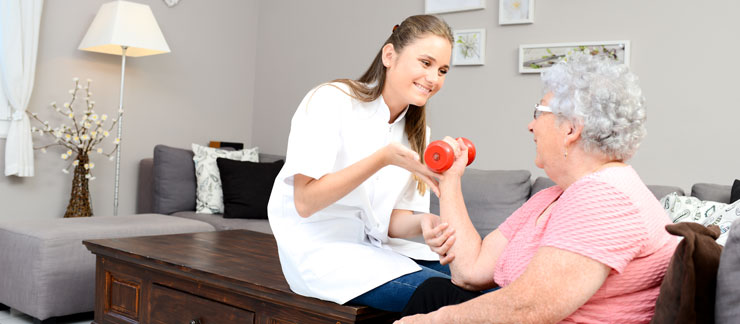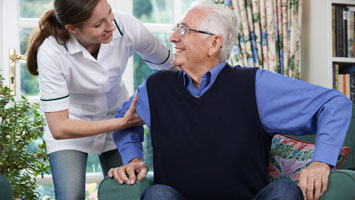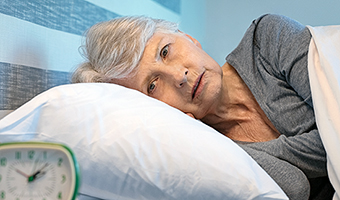How Professional Caregivers Can Help Manage Your Elderly Loved One’s Weight
A healthy weight helps protect your elderly loved one from illness. Unfortunately, as your senior ages, it’s harder to maintain a healthy lifestyle alone. Maybe Mom has started to skip her routine walks. Or your aging dad is showing signs of poor self-care. Tending to your senior is a demanding job, while you juggle a hectic day-to-day schedule. But there are resources available to help your loved one maintain a healthy weight.
A professional caregiver can be of great assistance. For example, Bob Webb began to experience frequent bouts of forgetfulness in his late 80s. He lived by himself. Friends and family gradually noticed his pants and jackets were becoming too loose. Webb was forgetting to eat regular meals. Once a professional caregiver stepped in to prepare food at his house, Webb returned to a healthier weight.
Without close supervision, it’s easy to overlook weight. Experienced caregivers can be instrumental in noticing changes in your loved one's eating behavior and weight.
Professional Caregivers Monitor Weight Loss and Illness
The body naturally loses muscle mass and bone density due to aging. Your elderly loved one faces a risk of "anorexia of aging," where the senior loses too much weight because of difficulties in eating alone. Per a medical journal article in Nutrients, “In particular, problems eating by oneself, difficulty in getting foods, and lack of cooking skills are relevant risk factors for anorexia of aging.” These risk factors may eventually lead to physical weakness and rapid health decline.
Companion care is a practical solution because a professional caregiver can help shop and prepare meals for your loved one. The experienced caregiver also ensures your senior is eating regularly and meals will be prepared in the comfort of the home.
Fluctuations in weight may indicate an underlying health condition. Should your senior’s weight require medical attention, a professional caregiver can be invaluable in bringing this to you and your family’s attention.
Sometimes, medications can upset the appetite. If your senior follows a medication plan, it's essential to foster good eating habits. Experienced caregivers have serviced many people in your loved one's situation. As a result, your senior receives reliable care from a trusted individual.
Professional Caregivers Can Identify Eating Disorders in the Elderly
Eating disorders are not limited to the young. Anorexia nervosa, bulimia nervosa and binge-eating disorder can develop at any age. Emotional and psychological conditions can lead to eating disorders in the elderly. Common conditions include loneliness, anxiety, depression and negative body-image. Often, the eating disorder remains undetected for some time. Meantime, an aging body is more susceptible to health complications from an eating disorder. For example, a drastic weight drop stresses heart function. A stressed heart puts your senior in danger for a stroke or heart attack.
Safeguard your senior’s well-being. A wide range of services from a professional caregiver can help prevent the development of an eating disorder in the elderly: “...activities of daily living, especially caring for personal appearance and hygiene; cognitive and social engagement; mood, attitude, and temperament; and maintenance of moderate exercise and physical activity to keep or stimulate appetite,” according to Dr. Stanley Dudrick, MD, FACS.
A professional caregiver will foster a positive body-image, provide companionship and social stimulation. S/he has the training to fulfill a variety of roles: meal preparer, grooming/dress assistant, grocery shopper and walking companion. Tasks are customized to the needs of your senior.
Professional Caregivers Can Help Fight the Dangers of Weight Gain
Weight gain may indicate an unhealthy lifestyle or an adverse health condition. Moreover, a substantial increase in weight or obesity can precipitate chronic disease. Be proactive. Steer your elderly loved one away from excess body fat. According to the U.S. Department of Health and Human Services, "Excess body fat leads to a higher risk for premature death, type 2 diabetes, high blood pressure, high blood cholesterol and triglycerides, heart disease, stroke, gallbladder disease, respiratory dysfunction, gout, arthritis, and certain kinds of cancers."
This can be an enormous responsibility for a family caregiver to assume. Don’t feel guilty if you’re currently in this situation and are unsure if you can give your senior loved one the attention they now need. That’s why professional caregivers exist.
If you have an aging loved one whose weight is starting to concern you, click here for more information on how professional caregivers can help facilitate proper diets.













